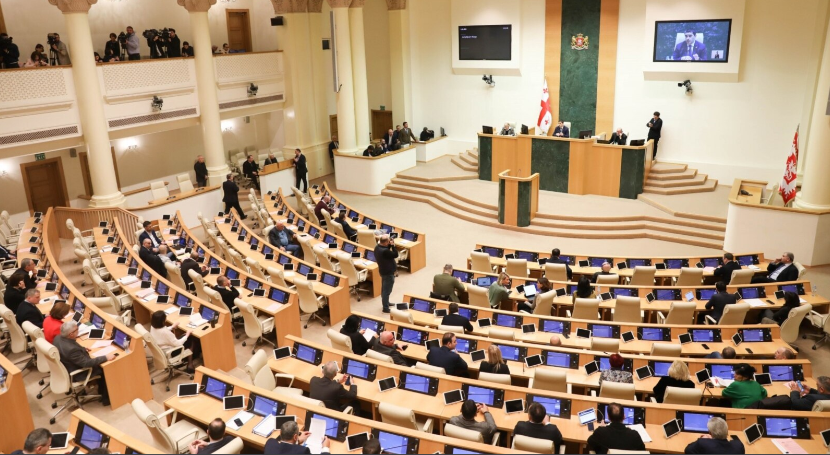საერთო ცხელი ხაზი +995 577 07 05 63


Social Justice Center responds to the statement of Anri Okhanashvili, the chairman of the Legal Affairs Committee of the Parliament of Georgia, in which he announced legislative amendments on the criminalization of desecration of religious buildings and objects.
The need for legislative amendments by the authorities was explained by what happened in Sameba. In particular, on January 9, the media published footage showing civil activists smearing paint in the Trinity Cathedral on the icon depicting Saint Matrona and Joseph Stalin. The activists' protest was caused by depicting Stalin on the icon, which, despite strong public criticism, did not become the subject of a timely and appropriate response from the Patriarchate. The Ministry of Internal Affairs has investigated the mentioned fact based on Article 166 of the Code of Administrative Offenses, which refers to minor hooliganism and provides up to 15 days of administrative imprisonment. Anri Okhanashvili noted that even though the incident in Sameba is considered an administrative offense according to the acting Georgian legislation, proportional responsibility for such actions is not prescribed.
A detailed and nuanced discussion of the draft law will be possible after its text is made public. However, from the initial and general assessment, the Social Justice Centre believes that the new legislation may contradict the international standards established by the freedom of expression, and the attempt to regulate such a subjective field (offense) violates the constitutional principles of foreseeability and the rule of law.
According to the case of the European Court, freedom of expression is a basic necessity and ground for a democratic society. Its scope of protection spreads not only to those ideas and expressions that are acceptable to the majority and contain popular or neutral opinions but also such expressions and opinions that are shocking, disturbing, or insulting for the state or any part of society since pluralism, tolerance and freedom of ideas are unconditional prerequisites for a democratic society. [1]
At the same time, the court defines that restricting freedom of expression may be reasonable if interfering with the right leads to eliminating religious hatred. However, the applied restriction and the legitimate purpose must be justified only by protecting religion and belief. In addition, by taking into consideration that the court calls unreasonable the expectation of both religious minorities and people following dominant religions that, no one will criticize their beliefs and views. Court highlights that the believers are obliged to accept and tolerate critics and rejection expressed towards their belief.[2]
The UN High Commissioner for Human Rights has pointed out that national legislation to punish insults of religion is often counterproductive, as all dialogue, debate, or criticism related to religion, much of which may be constructive, healthy, and necessary, may be censored. The Commissioner recommends that states with laws on the offense of religion should repeal them because such laws distort the enjoyment of freedom of religion or belief and healthy dialogue and debate about religion.[3]
The Venice Commission also considered the extent to which criminal law is adequate and/or effective in balancing the freedom of expression and respect for religion. It concluded that criminal sanctions are only justified if the act contains incitement to hatred (except when it can be qualified as a violation of public order).[4]
Some European countries do indeed have legislation on religious blasphemy. Still, it should be considered that there is an opinion that the said legislation, due to its vague and unpredictable character, contradicts the guiding principles of the freedom of religion of the European Union.[5] In addition, when discussing the legislation of European countries, the increasing tendency to annul laws on religious blasphemy in recent years should also be considered.[6] Public campaigns conducted by civil society organizations to annul the legislation prohibiting insulting religion in EU member states also indicate the same trend.
It is important that, in our case, the authorities are not debating the criminalization of insulting religious feelings, which is explicitly criticized by international human rights law. However, the criminalization of insulting "religious buildings" and "things" also carries high risks of arbitrary interference with freedom of expression and should be critically considered by the state. More specifically:
In light of the above, the Social Justice Centre considers that:
Social Justice Centre will provide a detailed and comprehensive analysis of this issue once the draft law will be available.
[1] ECHR Decision on the case: „Wingrove v. The United Kingdom.”
[2] ECHR judgment on the case: Otto-Preminger-Institut v.Austria”, Par:47.
[3] United Nations General Assembly, Report of the United Nations High Commissioner for Human Rights on the expert workshops on the prohibition of incitement to national, racial or religious hatred, para: 19 available: https://shorturl.at/LM468,
[4] European Commission for Democracy Through Law (Venice Commission), Report on the Relationship between Freedom of Expression and Freedom of Religion, The Issue of Regulation.Par:89, 92, available: https://shorturl.at/bmuIY
[5] For example, according to Article 166 of the Criminal Code of Germany, It is punishable to insult rules, church institutions or other religious or ideological associations by disseminating written material in a public space in such a way that it may cause a disturbance of public peace. However, "disturbing the public peace" is a much broader concept than "incitement to hatred or violence" and is inconsistent with the EU guidelines on freedom of religion, which distinguish between expression that intentionally incites violence and, on the other hand, expression that may cause violence. The latter can be broadly interpreted to restrict critical or cynical expression.
[6] OSCE, Defamation and Insult Laws in the OSCE Region: A Comparative Study, available: https://rb.gy/cj4a7a
The website accessibility instruction